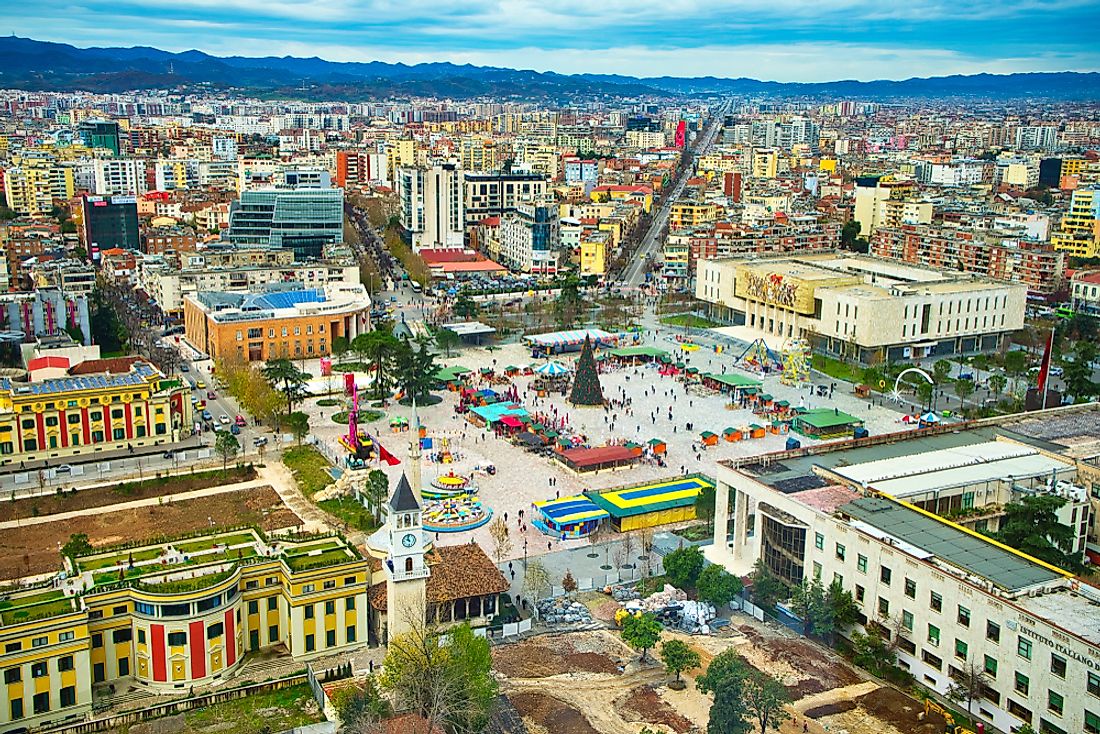What are the Biggest Cities in Albania?

Tirana is Albania's largest and capital city and the heart of the country's cultural, economic and governmental activity. Major port cities in the country are Durrës and Vlorë which was Albania's first capital. Elbasan and Shkoder are among the oldest cities in Albania, and they play vital roles as cultural centers of the country.
According to the 2011 Census, Albania had a population of about 2,831,741. Around 858,262 people live in Tirana, Albania’s capital.
The 5 Biggest Cities In Albania
Tirana - 858,262
Tirana, the capital city of Albania, lies on the western side of Albania surrounded by hills. The Dajiti Mountain lies to the east. There is a small valley which overlooks the Adriatic Sea. Two rivers, Tirana and Lane, flow through the city. Tirana is also the 7th largest city in the Balkan Peninsula with a population of 858,262. The city is home to many local universities, academic institutions, and commercial companies. Tirana is the heart of Albania and it is the economic, cultural, political, and social center of the country. All national institutions are located in Tirana most notably the parliament, government house, ministries, presidential palace, and constitutional courts. The city experiences a humid subtropical climate.
Durrës - 201,519
Durrës lies about 33 kilometers from Tirana at the coast region of Albania. The city is one of the oldest parts of Albania. Durrës lies at an opening to the Adriatic Seas opposite the ports of Bari and Brindisi in Italy. Durrës port handles over 3.4 million tons of cargo annually, making it the 10th largest cargo port along the Adriatic Sea. It provides a link to Western Europe and also plays a vital role as a dockyard, shipyard, and has many manufacturing industries producing plastic, leather, and tobacco products. On the southern coastal lies Golem, a tourist hub. More than 800,000 visitors visit Durrës annually as tourists.
Vlorë - 141,513
Vlorë is the second largest port in Albania after Durrës. The city was founded in the sixth century BC by ancient Greeks who named it Aulon. During the Roman Empire reign, the city was part of Epirus Nova, a vital port to the sustainability of the empire. On November 28, 1912, Ismail Qemali declared Albania independent on Vlorë’s soil. It then became the country’s first capital but in 1914 Italians invaded it and remained there until 1920 when Albanian rebellion drove out the Italian forces from Albania. In 1939, Italian forces invaded again until Italians surrendered in 1943 to its allies. The Nazis then occupied it until the communist liberated it in 1944. Vlore experiences a Mediterranean climate where summers are hot dry and cold, wet winters. Vlore is an important seaport and commercial center as well.
Elbasan - 126,703
Elbasan in central Albania is located along the Shkumbin River. Elbasan has a total population of about 126,703 making it one of the biggest cities in the country. Elbasan history dates back to the 5th century as it played a critical role in the spread if Christianity. Sights in the city include the two ancient walls stills standing, cobblestone streets, old houses, and the clock tower.
Shkodër - 102,075
Shkodër is one of the most ancient places in Albania serving as an important economic and cultural center. Shkoder has a population of about 102,075 people living in 872.71 km2 area. The city strategic location near the Adriatic Sea and Italian ports made it an important region in many different epochs. It once served as the capital of an old Illyrian tribe called Labiates. The Lake of Skadar lies to the west and connects Albania to Montenegro. The city lies between two rivers, Drini and Buna on the eastern shores of Lake Shkoder. The Buna River joins Shkoder to the Adriatic Sea while the Drin River links the city of the Ohrid Lake. Shkoder experiences a Mediterranean climate. Main economic activities in the city are tobacco processing, manufacture of cigarettes, textile industries including the production of garments and silk products, production of conserved foods and alcoholic beverages.
The Economy Of Albania
The economy of Albania is diversified. The country experiences a significant number of tourists each year making tourism one of the biggest contributors to the economy. Almost all cities have tourism as a primary economic activity. Albanian cities have established manufacturing industries. Most cities thrive on Tobacco products, cigarette manufacturing, production of preserved foods and alcoholic beverages. Also, these towns have agricultural areas surrounding them, which make agriculture a significant economic activity to the Albanians.
Which Are The Biggest Cities In Albania?
| Rank | City | Population |
|---|---|---|
| 1 | Tirana | 858,262 |
| 2 | Durrës | 201,519 |
| 3 | Vlorë | 141,513 |
| 4 | Elbasan | 126,703 |
| 5 | Shkodër | 102,075 |
| 6 | Kamëz | 66,841 |
| 7 | Fier | 55,845 |
| 8 | Korçë | 51,152 |
| 9 | Berat | 32,606 |
| 10 | Lushnjë | 31,105 |











